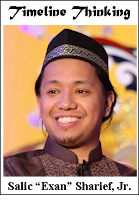Moral Reformation among the Youth of Lanao
In today’s generation, is there a direct proportional relation between confidence and manners? What about the relation of informative learning with the principles of ethical conduct?
It is no longer unusual to meet students and young leaders filled with brilliance and knowledge on so many things, be it political, social or technical, name it and they sure have something to say about it. Information is all over, with just a click on the smart phones, all the years spent on data gathering and verification are laid down on a single page visually scrolled by the point finger. So as far as experience is concerned, you can summarize ten years with a five-minute skim over the reviews or comments.
Gone were the days when the professor has all the authority to speak alone and chose information to share inside a classroom. We have now a reversed approach with learning – that is, to listen to what the students has to say while the professor only verifies whether what has been told is correct or not. Most students even have the courage to criticize or indicate errors of the professor.
New breed leaders are apprehensive of being called one. Most would hesitate to be tagged as a neophyte in their chosen endeavor on the excuse of being long exposed with self-taught lessons on the matter. While some remain polite, others are too arrogant in conventions or seminars, highlighting how they belittle the efforts of our past leaders, who have progressed from being “young ones” to now being “young once.”
On this account, it is now apt to ask and assess the consequences of such predicaments. At one point, it should be considered as advancement since the present times require speedy adjustment on a fast-paced societal growth. There is now an availability of so many information and teachings online, hence, leading to more skillful and knowledgeable individual who have access to these available technologies. In effect, they are now more confident, loud, self-assured and assertive of their own opinions and principles in life. That goes in tandem with the western concept of freedom and democracy. On the other hand, Asian tradition and culture has high value on respect of elders. In fact, this is also vividly embedded in the Maranao Taritib and Igma.
There is then a dilemma as to how to properly balance these opposing postulations. Reality has it though, that more are inclined to following the hunger for confidence and assertiveness at the expense of forgetting the lessons of elderly respect. Worthy to mention a famous line that knowledge without religion makes one a clever devil. Moreover, any religion teaches the moral fibers of respect, humility and kindness as it forbids arrogance and vanity.
Cultured past. Beleaguered today. Do we need reformation for tomorrow?
It is no longer unusual to meet students and young leaders filled with brilliance and knowledge on so many things, be it political, social or technical, name it and they sure have something to say about it. Information is all over, with just a click on the smart phones, all the years spent on data gathering and verification are laid down on a single page visually scrolled by the point finger. So as far as experience is concerned, you can summarize ten years with a five-minute skim over the reviews or comments.
Gone were the days when the professor has all the authority to speak alone and chose information to share inside a classroom. We have now a reversed approach with learning – that is, to listen to what the students has to say while the professor only verifies whether what has been told is correct or not. Most students even have the courage to criticize or indicate errors of the professor.
New breed leaders are apprehensive of being called one. Most would hesitate to be tagged as a neophyte in their chosen endeavor on the excuse of being long exposed with self-taught lessons on the matter. While some remain polite, others are too arrogant in conventions or seminars, highlighting how they belittle the efforts of our past leaders, who have progressed from being “young ones” to now being “young once.”
On this account, it is now apt to ask and assess the consequences of such predicaments. At one point, it should be considered as advancement since the present times require speedy adjustment on a fast-paced societal growth. There is now an availability of so many information and teachings online, hence, leading to more skillful and knowledgeable individual who have access to these available technologies. In effect, they are now more confident, loud, self-assured and assertive of their own opinions and principles in life. That goes in tandem with the western concept of freedom and democracy. On the other hand, Asian tradition and culture has high value on respect of elders. In fact, this is also vividly embedded in the Maranao Taritib and Igma.
There is then a dilemma as to how to properly balance these opposing postulations. Reality has it though, that more are inclined to following the hunger for confidence and assertiveness at the expense of forgetting the lessons of elderly respect. Worthy to mention a famous line that knowledge without religion makes one a clever devil. Moreover, any religion teaches the moral fibers of respect, humility and kindness as it forbids arrogance and vanity.
Cultured past. Beleaguered today. Do we need reformation for tomorrow?




